Afghanistan War, CIA Sponsored Terror, Civil Liberties, Criminalizing Dissent, Habeas Corpus, Human Rights, Iraq War, Military Tribunal, Political Prisoner, Surveillance, Torture, War Resister
Podcast: Play in new window | Download
Updates:
—-

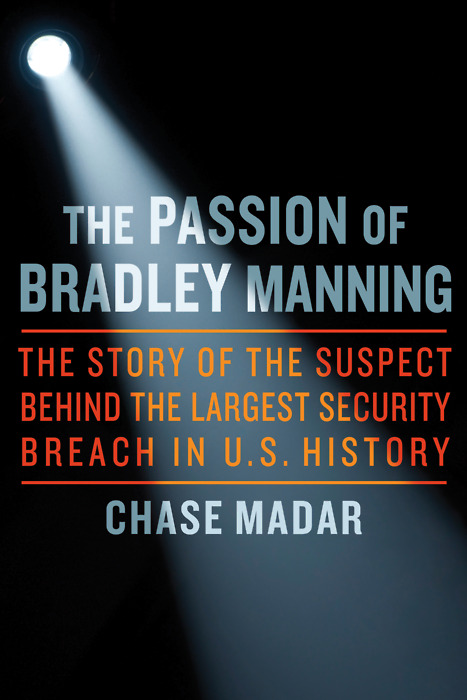
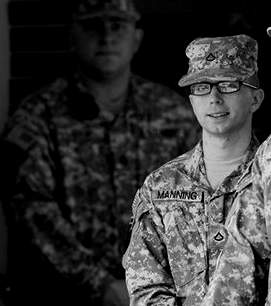
The Passion of Bradley Manning: The Story of the Suspect Behind the Largest Security Breach in U.S. History.
We continue to look into the the Bradley Manning story, the biggest whistle-blower case in US history. Attorney Chase Madar joins us in the studio, he’s the author of The Passion of Bradley Manning: The Story of the Suspect Behind the Largest Security Breach in U.S. History. The book moves through Manning’s childhood and up to what led him to allegedly upload volumes of classified secret information to Wikileaks. Madar highlights the value of publicly exposing the endless criminal and immoral actions while government secrecy spins out of control, classifying 77 million documents a year. He also asks what can be done to protect Bradley Manning as a whistle-blower. Since his arrest 2 years ago, Manning’s formal court martial proceedings are not scheduled to begin until February 2013, and as many listeners know the most lethal charge is aiding the enemy.
Attorney Chase Madar:
- I worked as a staff attorney for many years at a great non-profit in Bushwick section of Brooklyn doing all kinds of low tech services for Spanish speaking immigrants.
- I quit that and have been writing about foreign affairs. I got put on the sight of Bradley Manning by Tom Englehart, who edits the great TomDispatch web project.
- So many important issues collide in this case, whether its the comparative risk to our security of secrecy versus leaks. How we judge threats, how we misassess threats. How we use solitary confinement as punishment, is it an acceptable punishment?
- What power does information have anyway? A lot of intellectuals think that information has an incredible catalytic effect.
- Bradley Manning enlisted in the Army in October 2007. He’s deployed to Iraq after all kinds of training in Army intelligence in 2009.
- He allegedly begins leaking things in early 2010 and he’s arrested in late May 2010 over 2 years ago now. He was held in solitary confinement, very strict punitive isolation in Quantico Marine Corp base in Virginia, from July 2010 to April 2011.
- We’re looking at 2.5 years of pretrial confinement.
- You can divide up the Wikileaks leaks allegedly supplied by Bradley Manning in 3 categories. Iraq material, thousands of war logs: raw reports file by soldiers, Afghan war logs, it’s a composite of a war that’s weirdly aimless.
- Obama did campaign as the whistle-blower’s best friend, and he has prosecuted twice as many as all previous administrations.
- Here’s one theory I find persuasive. It’s important for Obama to have the intelligence services on his side. This was a way for him to show the CIA that he would go along them.
- I would like to see a serious change in foreign policy which has gone off the rails.
- We haven’t the kind of course correction with Obama that many had hoped for.
- I hope Wikileaks do disrupt foreign policy more. There’s been all kinds of smack talked about Bradley Manning, he’s a weirdo, a malcontent, he did what he did because he’s screwed up, he did because he’s gay.
- His motives are very plain to see in the chat logs between him and the informant.
- The Manning chat logs – they read like a tragic novella.
- So much of our secrecy law is designed to keep the American public in the dark.
- I think we have badly confused being clueless with being safe.
- He comes across as an immensely thoughtful, courageous and very principled young man. In some ways he’s an extreme version of the millennial generation who have a lot of education and potential but find themselves not doing too well.
- His father was in Naval Intelligence and he’d grown up with a sense of patriotic responsibilities.
- What makes him turn on the inside and leak these things?
- He’s asked to look into the arrest and capture by the Iraqi authorities a group of non-violent Iraqi protesters who were handing out pamphlets that were all about corruption in Iraqi government.
- We are light years away from total transparency.
- The main thing is to make records of the court proceedings publicly available.
- I think a guilty conviction and a heavy sentence of at least 50 years is a foregone conclusion.
- The wages of government secrecy, not security but disaster.
- It looks like the court martial won’t begin until January or February.
- Go to the Bradley Manning support network website. Send him a postcard.
- It’s your patriotic duty to browse the leaks.
- Legal Atrocities – by Chase Madar
Guest – Attorney Chase Madar , a TomDispatch regular and author of a new book, The Passion of Bradley Manning (OR Books). Madar tweets @ChMadar. He’s a contributor to the London Review of Books and Le Monde diplomatique and the author of a new book, The Passion of Bradley Manning (OR Books).
——————————————————-
Afghanistan War, Civil Liberties, Criminalizing Dissent, Human Rights, Iraq War, Prison Industry, Supreme Court, Surveillance, Targeting Muslims, Torture, Truth to Power, War Resister
Podcast: Play in new window | Download
Updates:
————
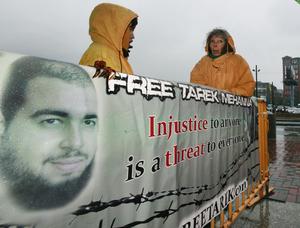
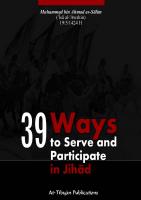
39 Ways To Limit Free Speech
39 Ways To Limit Free Speech is the title Law Professor David Cole’s recent article. Earlier this month, a 29-year old citizen from Sudbury, Massachusetts named Tarek Mehanna was sentenced to seventeen and a half years in prison for translating a document. The text he translated from Arabic is “39 Ways to Serve and Participate in Jihad” and its all over the internet, you can read it says David Cole, but don’t try to translate it. One issue in the government’s prosecution of this case is the use of the decision from the Brandenburg v. Ohio case in which the Supreme Court established that standard in ruling that the First Amendment protected a Ku Klux Klansman who made a speech to a Klan gathering advocating “revengeance” against blacks and “Jews.”
Professor David Cole:
- He was accused of providing material support to al-Qaeda by translating various documents and videos from Arabic into English. There’s no allegations that Mehanna ever met with or even talked to a member of al-Qaeda. There are no allegations that the translations were delivered to or provided to al-Qaeda which was the designated group.
- The government argued that because he translated these documents and put them up on the web and hoped to encourage people to support jihad and support al-Qaeda, that’s enough to constitute material support.
- Here’s an instant in which the government is prosecuting pure speech but no showing that the speech was connected to illegal conduct, no showing that it was intended to produce eminent lawless action, which the Supreme Court said is required to produce under Brandenburg.
- It’s enough that he put it up on the web and wanted to support al-Qaeda.
- If that’s a crime what about the New York Times when it does a report on one of the many messages Osama Bin Laden put after 9-11?
- I represented the Humanitarian Law Project in the case that went to the Supreme Court in 2010, in which the HLP was in engaging in advocacy of human rights and peace, clearly non-violent, non-criminal conduct.
- But because they wanted to do it to and with the Kurds in Turkey and particularly the political representatives of the Kurds in Turkey which is the Kurdistan Workers Party (designated as a terrorist organization) the government argued that it was a crime to teach the KWP to bring human rights claims in Geneva and work with them in peace overtures to the Turkish Government.
- The Supreme Court upheld that, but doesn’t apply to independent advocacy. (until now)
- Now if you wanted your speech to support terrorist organizations, even if you did it independently of that organization, even if you never met or talked to anyone in that organization, we can make it a crime.
- Very much about declaring a “new front” in the war on terror and the front is going after internet propaganda.
- To me it recalls the kind of aiding the enemy prosecutions we saw in World War 1.
- We as citizens need to be active in monitoring and pushing back against this material support statute.
Guest – Professor David Cole teaches constitutional law, national security, and criminal justice at Georgetown University Law Center. He is also a volunteer attorney for the Center for Constitutional Rights, the legal affairs correspondent for The Nation, a regular contributor to the New York Review of Books, and a commentator on National Public Radio’s All Things Considered. He has been published widely in law journals and the popular press, including the Yale Law Journal, California Law Review, Stanford Law Review, New York Times, Washington Post, Wall Street Journal, and Los Angeles Times.
——————-

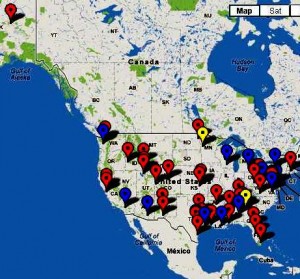
FAA Releases Lists of Drone Certificates—Many Questions Left Unanswered
Earlier this year we discussed the partnership with Cornell University and Technion-Israel Institute of Technology. The two institutions are working together to build a campus in New York City. Technion is involved with developing robotic weapons systems, which include aerial drones, and unmanned combat vehicle technology. There are many more universities involved with drone technology. Through a series of Freedom of Information requests by the Electronic Frontier Foundation, the FAA has been forced to reveal approximately 63 active drone sites. These sites are located in 20 states and their owners include military and universities. Universities include Cornell, (which we just mentioned) the University of Colorado, Georgia Tech, Eastern Gateway Community College and many more.
Attorney Jennifer Lynch:
- We filed a FOIA request with the FAA last April asking for copies of all the certificates of authorization and the special air-worthiness certificates that the FAA issues to anybody to wants to fly a drone in the US.
- We asked for these lists which are called COAs, or Certificates of Authorization. The COAs apply to public entities like state and local law enforcement, universities, the federal government.
- We got two lists from the FAA and the FAA says these cover all of the entities that applied for an authorization to fly a drone in United States.
- They’re very interesting, the COA list includes some unsurprising entities like DARPA, DHS, Customs and Border Protection, the FBI, various branches of the military. We already knew those entities were flying drones.
- What was more surprising was the number of universities and colleges on the list.
- Universities that have an aerospace engineering program they may be seeking authorization so the students can learn about and design drones.
- The Electronic Frontier Foundation is a civil liberties non-profit, we focus on civil liberties and new technology, and we’re concerned about surveillance equipment used by the government.
- Drones are a duel use technology, they can be used for good or for bad.
- They can see inside buildings, survey an area at night with heat sensors, they also have the ability to carry communications intercept tools. You could swap out various payloads on a drone.
- Then of course these drones can carry weapons.
- You can build your own drone, DIYDrones.
- We don’t know too much about what’s going on now. The reason the EFF file the FOIA request in the first place is that we just don’t know how agencies are using these drones.
- What we found is that a lot of the police forces that have drones are required to fly them under 600 feet. If its something that flying under 600 feet you’re going to be able to see that.
- Congress was getting a lot of pressure, and the FAA was getting a lot of pressure from state and local law enforcement, the military and the federal government to authorize more drones to be used in the United States.
- We’ve heard from the Congressional Research Service that 1 in 3 warplanes right now is a drone.
- The wars are going to end and the military is going to want to something with these drones.
Guest – Jennifer Lynch, staff attorney with the Electronic Frontier Foundation and works on open government, transparency and privacy issues as part of EFF’s FOIA Litigation for Accountable Government (FLAG) Project. In addition to government transparency, Jennifer has written and spoken frequently on government surveillance programs, intelligence community misconduct, and biometrics collection. Prior to joining EFF, Jennifer was the Clinical Teaching Fellow with the Samuelson Law, Technology & Public Policy Clinic at UC Berkeley School of Law. At the Samuelson Clinic, Jennifer specialized in privacy and intellectual property issues, including investigations on social media, privacy and the smart electrical grid, digital books, and open source regimes for biotech. Before the Clinic, Jennifer practiced with Bingham McCutchen in San Francisco and clerked for Judge A. Howard Matz in the Central District of California. She earned both her undergraduate and law degrees from UC Berkeley.
—————————–
Afghanistan War, Civil Liberties, Criminalizing Dissent, FBI Intrusion, Human Rights, Prison Industry, Supreme Court, Surveillance, Targeting Muslims
Podcast: Play in new window | Download
Updates:
——
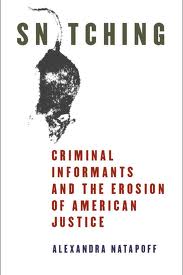

Snitching: Criminal Informants and the Erosion of American Justice
The FBI now spends more than 3 billion dollars a year on counter-terrorism, the bureau maintains a team of 15 thousand spies in a nationwide network of informants. Criminal informants or snitches are part of a criminal system most people know little about. Many of these informants are tasked with infiltrating Muslims communities in the United States. We’ve discussed in the past, the expanded FBI guidelines plus the broad over reaching powers and underhanded tactics the FBI use when targeting Mosques and Muslim Americans.
We talk today with Professor of Law and author Alexandra Natapoff, about her book Snitching: Criminal Informants and the Erosion of American Justice. Her book catalogues the downside in the use of snitches on social structure and democracy and suggests ways to make the use of informants acceptable within the criminal justice system.
Professor Alexandra Natapoff:
- Snitching is such a massive part of our criminal justice system even though the public rarely gets a good look at it.
- It’s an under the radar aspect of the way our criminal justice system handles investigations, the way it handles cases, the way it shapes our case law.
- It’s such a powerful deal, a deal that exerts a huge amount of influence and plea bargaining.
- The reality is that this is a deeply under-regulated arena. The handler is the law enforcement official who creates and uses an informant.
- It could be a police officer talking to a street corner addict cutting a deal right then and there.
- It could be an FBI agent who has an established documented supervised relationship with a long term criminal informant.
- Somebody may be suspected of a crime or even just of interest to the government. People who have mild brushes with the criminal system can end up through this mechanism of criminal informing entering into a world in which really anything can happen to them.
- Argument: Either you let us use informants in an unaccountable, invisible, secretive, undocumented way or we can’t run the criminal system at all.
- We permit the barter of crime under the radar, in a way that is unfair to other defendants and other suspects. We produce unreliable information through the use of informants without regulation.
- My contention is that we shouldn’t ban this practice, but run it as any other public policy with transparency and accountability and some rules.
- My favorite criminal informant of recent is Jack Abramoff.
- Usually we don’t learn when informants have been mistreated because often they have very little power.
- The courts have said, informants proceed at their own risk.
- This is a deal that they can enter if they want to risk their life.
- The law does not owe criminal informants much protection. Our criminal system is built on the principle that the defendant should not have to face the government unaided by council.
- That’s a principle that should be extended to criminal informants.
- The state of Florida passed a ground breaking law, called Rachel’s Law.
- What sort of deal should we permit the government to cut with informants?
- The use of criminal informants is a massive source of error in capitol cases.
- States across the country are starting to impose greater restrictions on the use of criminal informants, in particular jailhouse snitches as a way to improving reliability of the information.
- Confidential Informant Accountability Act – Federal Legislative Proposal
- One of the things the government doesn’t keep track of is how many crimes are committed by criminal informants in the pursuit of investigating new cases.
Guest – Alexandra Napatoff, professor of Law at Loyola Law School, Los Angeles, and a member of the American Law Institute. I have also been a federal public defender, a community organizer, and the recipient of an Open Society Institute Community Fellowship.
————–
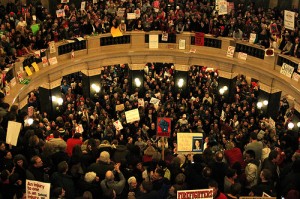
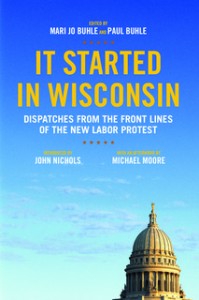
It Started in Wisconsin: Dispatches from the Front Lines of the New Labor Protest
Remember the multi-day occupation of the Wisconsin State Capitol by tens of thousands of people. Massive demonstrations erupted when the Republican controlled state government proposed to dismantle public employee bargaining rights as Wisconsin trade unions already conceded to wage and benefit cuts. These protests became the largest labor demonstrations in modern American history. Protesters from the Middle East sent pizzas and solidarity as thousands occupied Madison’s Capitol building.
We’re joined today by Paul Buhle, historian, and editor of the book It Started in Wisconsin: Dispatches from the Front Lines of the New Labor Protest. A powerful collecton of eyewitness reports and essays by striking teachers, students, and many others. This book exposes the corporate agenda that imposed anti-union legislation across the country and highlights the power of the people coming together in protest.
Paul Buhle:
- Brecht Forum, Friday night – April 27,2012
- The “it” is very large, perhaps vaporous and very promising. We were thinking of occupy in the sense that Madisonians, labor supporters from as far away as California, occupied the State Capitol, the rotunda in February of last year and remained there for some weeks.
- The “it” may mean occupy or the emergence of a new kind of movement.
- We should have seen it coming but we were deluded or Walker, when running for election never mentioned these promises or threats at all and made some statements about getting along with unions when he was a county executive.
- The response was just as stunning as the shock. A mass outpouring that really began with students in Stoten, an old Norwegian community about half an hour south of Madison – working up their own protests with facebook to support their teachers.
- And then, the following weeks, a massive outpouring of people around the Capitol and then occupying the Capitol.
- Things went on and on until there were crowds of 150 thousand in a town of Madison that has normally only 250 thousand residents.
- Pacifica has been in the business from the late 1940s in the Bay area, in providing the documentation that other commercial radio stations rarely provide.
- I would say these protests in Wisconsin are probably the most recorded mass movement of the Left in recent history.
- Among the most important developments, relative to the stories in the history of labor, the unions of public workers are substantially, if not overwhelmingly women.
- So, the shape of the movement, perhaps its cultural character, perhaps the infernal degree of politeness that outsiders frequently complained about, the chant – let us in, let us in please.
- What it demonstrated was that women in the labor movement were ferociously militant.
- My assessment was that the labor movement was in no way prepared to stage a general strike.
- Nor that a massive walk out of public workers mean that the wheels of industry would stop what few wheels are left.
- The sense that public workers wish to put pressure on the political system.
- Contrary to our expectations of the Democratic Party in general, assorted leaders, were quite wonderful in their constituencies and the things that they did, and how they related to the movements.
- As an editor and producer of radical comics, I’m always interested in new developments in the field, and its exciting there are young comic artists who are working in and around “occupy.”
Guest – Paul Buhle, senior lecturer at Brown University, a historian of American radicalism., a former member of Students for a Democratic Society and author of many books including images of American Radicalism. Also, Che, A Graphic Biography, and Isodore Duncan, a graphic biography by Sabrina Jones.
———–
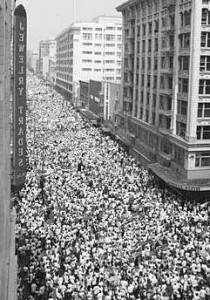

May Day: Workers’ Rights and Immigrant Communities
In the past year, public employees around the country have rallied to hold on to their collective bargaining, workers rights and pensions. May Day protests this year will emphasize these issues and will be especially significant for immigrant rights in California that directly effect certain communities. On May Day in 2006, hundreds of thousands took to the streets of San Jose marking one of the largest demonstrations in California history.
Guest – Celina Benitez, director of the Committee In Solidarity With the People of El Salvador, Celina is also with the Southern California Immigration Coalition and produces radio for Suplemento Comunitario on sister station KPFK in Los Angeles.
——————————————————-
Afghanistan War, Civil Liberties, Criminalizing Dissent, FBI Intrusion, Habeas Corpus, Human Rights, Iraq Veterans, Iraq War, Surveillance, Torture, War Resister
Podcast: Play in new window | Download
Updates:
————————–
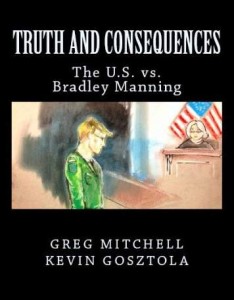
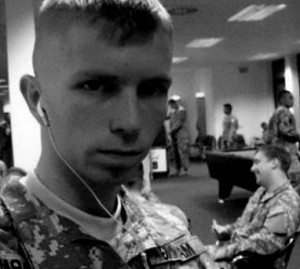
Truth and Consequences: The U.S. vs. Bradley Manning
In the past year, we’ve covered Wikileaks and specifically the Bradley Manning case in our updates. We talk today with Greg Mitchell co-author of the new published book, Truth and Consequences: The U.S. vs. Bradley Manning. In the first part of the book titled Solitary Man, Greg Mitchell gives readers a detailed look into the character of Bradley Manning. The second part of the book details the Bradley Manning trials written by co-author Kevin Gosztola. Hard journalism let the voices of friends and family document the important details in Manning’s life leading up to Wikileaks and then the book dives into the complexities of the trial. In the preface Greg writes “Ultimate truths, in this case, may lead to ultimate consequences for one who would not be silent.
Greg Mitchell:
- The second half of the book is really the only thing out there that covers in depth what has happened to him in the last few months.
- Namely his court martial proceedings after he was imprisoned for a year and a half. His first hearing was last December. He is awaiting what is expected to come out as a formal court martial in August. If it does start in August, it will be well over 2 years since he was arrested.
- A lot of the charges are related to passing along to Wikileaks, this classified secret information. Course the most dynamite charge is that he gave aid to the enemy.
- Who is the enemy? The government was forced to say that it was Al-Qaeda. That charge potentially carries the death sentence.
- They’re interested in punishing Manning, the big fish they’re after is Julian Assange.
- Last year there was global outrage when he was kept in solitary confinement, being forced to sleep naked, and stand at attention naked.
- All the top media outlets had a falling out with Wikileaks, and I think there’s a spill over from that.
- There hasn’t been any media coverage that really probes into what’s going on here.
- Over and over he (Bradley Manning) cited his outrage at what he was seeing in those cables and in Iraq, and things he was asked to participate in.
- The court martial will be extremely embarrassing to the military because they gave him access to these documents.
- He was a kid who grew up in Oklahoma, his parents eventually got divorced. He was a computer nerd, growing up. He realized in his teens, he was gay.
- He wasn’t a longtime peacenik or things like that, he always had some social conscience, and when he got to Iraq, he saw things that upset him.
- It may have never come out, that he would be arrested, except that he had these online chats with Adrien Lamo, who is a convicted hacker. Lamo decided Manning was talking too much about what he did and went to the authorities.
- The Manning case shows this incredible legacy of our wars in Iraq and Afghanistan, which have gone on for a decade, its never ending and yet the American public has never been brought face to face with what the US has done in those countries, civilian casualties.
Guest – Greg Mitchell writes daily for The Nation magazine’s web site. He is the author of more than a dozen books, including The Campaign of the Century (winner of the Goldsmith Book Prize), So Wrong for So Long: How the Press, the Pundits and the President Failed on Iraq, Why Obama Won, Tricky Dick and the Pink Lady, The Age of WikiLeaks, and with Robert Jay Lifton, Hiroshima in America and Who Owns Death? His most recent books are Atomic Cover-up and Journeys With Beethoven. He was the editor of Editor & Publisher from 2002 to 2009. He also served as longtime editor of Nuclear Times magazine, and before that was senior editor at the legendary Crawdaddy. Hundreds of his articles have appeared in leading publications and he has served as chief adviser for two award-winning documentaries.
—-

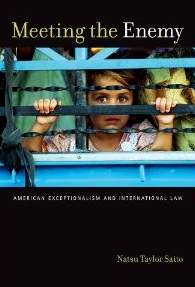
Lawyers You’ll Like – Attorney Natsu Saito
For our Lawyers You’ll Like series, we welcome back attorney and professor Natsu Saito. In our last interview, Professor Saito mentioned how the current system of international law evolved from the a broader agreement between the European colonial powers based on how they were not going to destroy each other in the process of taking over the rest of the world. It is this duality that Natsu writes about in her book Meeting the Enemy: American Exceptionalism and International Law. Professor Saito joined the College of Law faculty in 1994 and teaches international law, human rights, race and the law, immigration, criminal procedure, and professional responsibility. Her scholarship focuses on the legal history of race in the United States, the plenary power doctrine as applied to immigrants, American Indians, and U.S. territorial possessions, and the human rights implications of U.S. governmental policies, particularly with regard to the suppression of political dissent.
Professor Natsu Saito:
- The duality that the US does exempt itself (from international law) very consistently and very frequently and yet promotes international law very strongly and relies upon it.
- It has relied upon certain premises that are fundamental to the whole outlook and paradigm of colonialism – which is that there is a higher good, a more civilized approach the US embodies.
- The law doesn’t apply because we have a higher aim of civilization and that justifies not playing by the rules.
- The United States making others comply with human rights standards while exempting itself
- Moving humanity toward this higher goal is so critical because if you strip that away and you look at the realities on the ground, you see what has been termed Western civilization has been incredibly barbaric.
- In order to get around that analysis, you have to say it was for a higher good.
- I think the “left” tends to accept the general framework, and to make particular criticisms of policies and practices that are obviously problematic. The US government engaging in torture for example, but each instant is accepted as anomalous instead of the larger picture.
- It is too frightening even for the people on the left to deal with the reality that this is a country that sits on occupied land, illegally occupied by its own rules. People on the left want to make it a kinder, gentler colonialism.
- I started out thinking I was writing a book about the failure of the United States failure to comply with international law, as I got into it, the more interesting questions were the push / pull dynamics between reliance on international law
- The current system of international law evolved from the international law which was the agreement between the European colonial powers of how they were not going to destroy each other in the process of taking over the rest of the world.
Guest – Professor Natsu Saito, Department of Ethnic Studies, University of Colorado. Co-Sponsors: UCI Department of Asian American Studies; UCI Department of Planning, Policy, and Design; UCI Department of Criminology, Law and Society; The Center for Unconventional Security Affairs; The Center for Research on Latinos in a Global Society. Legal scholar Dr. Natsu Saito delivered a lecture on homeland security. Her lecture examined the implications of the USA Patriot Act on Civil liberties for immigrant groups and for the rest of the population
——————————————-
Afghanistan War, Civil Liberties, Criminalizing Dissent, Habeas Corpus, Human Rights, Targeting Muslims, Truth to Power
Podcast: Play in new window | Download
Updates:
- Michael Smith: Obama Balance Sheet 2011
—
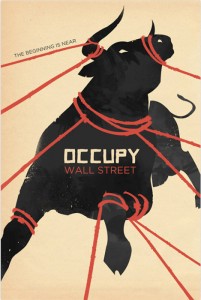
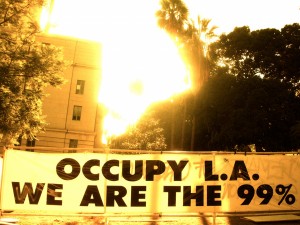
Year End Look Back 2011 – Jim Lafferty
Looking back on 2011, amid the colossal economic failure and compounded erosion of civil liberties, there were slivers of bright light to note, such as the wonderful activism and momentum of the Occupy Wall Street movement. The subsequent pulling together of activists, unions and lawyers marked this year in launching the foundation of a vital movement. Will this emerging movement continue to build and hold together to counter and restructure a corrupt and crumbling edifice of democracy?
Attorney Jim Lafferty:
- I’m now 73, I’ve not been as excited and optimistic about a movement since the sixties as I am around the occupation movement.
- It’s very exciting, it’s very broad and a lot deeper than the 1 percent would like to acknowledge.
- We don’t have a great sense of history in this country, we certainly don’t learn it in our high schools.
- Many of the young people that are at the heart and soul of this new movement are not the beneficiaries of a historical context of which to organize ourselves.
- It’s proven that you don’t need that to make a splash.
- When you go to the heart of capitalism itself which is what this movement does, its not surprising that they were met with fierce and brutal police reaction.
- They were ignored by the press in the first week or two, much of the press has been a distortion of it since.
- Reading the picket signs alone would tell you damn well what they want.
- This is an economic injustice movement. Capitalism can’t produce the type of economic justice that these tens of thousands are demanding.
- When Bonnie and I were arrested in New York at OWS, we even had cops saying to us, we’re part of the 99 percent.
- People aren’t making it and can’t make it in this country given the skewed and unjust economic system that capitalism represents.
- The US Census Bureau acknowledges that 100 million people are living in poverty or are in danger of slipping into poverty.
- When a presidential election cycle comes up, anti-war movements, civil rights movements, womens’ rights movements, tend to leave the streets.
- Don’t fall for the trap of electoral politics.
- Phase 2: I don’t know if that (encampments) are a sustainable way of operating a movement in this country.
- Here in L.A., one of the unions SIEU offered an indoor space to the movement where they can organize.
- Last week we shut down a number of home foreclosure auction sales.
Guest – Jim Lafferty, Executive director of the National Lawyers Guild in Los Angeles and host of The Lawyers Guild Show on Pacifica’s KPFK 90. 7 FM to reflect back on 2011 and a look ahead.
——-
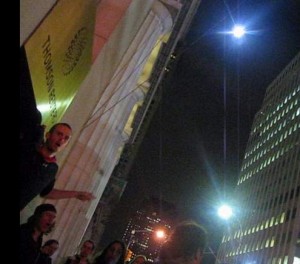

Occupy Wall St and the Brecht Forum
Kazembe Balagun, an activist and cultural organizer from the Bronx discusses the activism within the Occupy Wall Street movement through the Education and Empowerment Committee. Kazembe is also the program director at the Brecht Forum.
Kazembe Balagun:
- When I went down to Zuccotti, what I found was a vibrant community that had already started.
- It did really speak to the frustration of the current economic and political climate.
- As a public educator at the Brecht Forum you want to provide a context for these demonstrations.
- You want to have a conversation with them, in that this is not the first time this happened.
- We brought our comrade, Rick Wolff down there, and had a talk with almost 300 people. All great movements have great literacies.
- We have a movement where people are not only learning to speak in public but we’re all listening to each other.
- Wall Street has been the site of oppression for all people. Primarily because the wall that was built outside Wall Street was built to keep the Native Americans outside the business district.
- Black and brown communities have been the hardest hit in terms of foreclosure rates, stop and frisk. So what we have now is Occupy the Bronx, Occupy Sunset Park.
- We can occupy ourselves, that we can step into a new way of public life.
Guest – Kazembe Balagun, program director at the Brecht Forum.
——
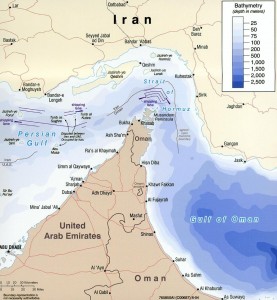
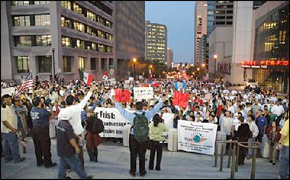
Unrelenting Global Economic Crisis: A Doomsday View of 2012
Continuing the look back and now ahead to 2012, we’re glad to have back with us, Jim Petras, author and former Professor of Sociology at Binghamton University, New York to discuss his latest article published on Global Research Unrelenting Global Economic Crisis: A Doomsday View of 2012. In this article Petras enumerates key events that will inevitably shape the next 12 months. He starts with – The Collapse of the European Union, then the recession deepens in United States, new wars erupt in the midst of this crisis.
These events, will lead to coming wars that will end America as we know it, meanwhile Europe sinks deep into austerity and class warfare intensifies. Petras says, that in response mass movements will continue to build, recede and re-emerge. Protests and rebellions, social revolutions and political power across the globe will be important catalysts.
Jim Petras:
- The economy has never really recovered from the recession. All the trends from the early Spring have been on the negative side. Instead of take off in 2012, we see the opposite taking place, slow down in investment, slow down in overall exports, slow down in financing the employment.
- What we do see is a big profit for the speculators. The speculators are back with a vengence. Carlyle has reported over 12 billion dollars in profits for the first 11 months.
- The speculators are working, the housing market is terrible.
- The debt has skyrocketed so much, so much was thrown at the bank bailouts, that there arent’ enough resources to pull us out of this recession.
- The Democrats are making deals with the Republicans to actually cut back on federal spending because of the deficit. I see us moving into recession by the end of Spring and heading toward worse a depression by the end of the year.
- This is all going to be exacerbated by a move toward a war with Iran, which will push oil prices up over 150 USD/barrel. The powers that are moving toward that war particularly, the Zionist power configuration.
- The consequences will be very very catastrophic for the economy of the United States.
- Speculators are back in power, the housing market is negative, the job employment is negative, 2011 trends are moving down toward recession, I don’t see any counter moves.
- Cumulative debt payments are negative, I don’t see any possibility of a injection of major public spending of which would turn this around or at least ameliorate it. Keep it at zero growth.
- Keep us at stagnation, rather then negative territory.
- Obama did nothing to stimulate a new structure in America which could take government support and move forward. What he did is pour the money into the people who caused the crisis on Wall Street.
- After Obama gets elected you’re going to see the most horrendous attack on the social security programs, medicaid, medicare. He’s holding back because he wants to get elected.
- He’s looking to slash and burn the only social programs that sustain American living standards for millions of workers who paid into this fund.
- This isn’t an entitlement program, this social insurance that has been paid for by American workers.
- He’s going to go into Iran, because he told the reformed Jews, all options are on the table, and he stationed an armada of Air Force smack facing Tehran. That’s a move toward war.
- Read Netanyahu and Barack, the defense minister of Israel and the Prime Minister of Israel, then the message gets transmitted to the New York Times, then it gets transmitted to Washington, you get a third hand.
- Why not look at the press releases coming out of Tel Aviv, if you want to know what tomorrow’s news is going to be.
- I think we’re going to see something new coming out of this great discontent.
Guest – James Petras, author and former Professor of Sociology at Binghamton University, New York.
Afghanistan War, CIA Sponsored Terror, Civil Liberties, Criminalizing Dissent, FBI Intrusion, Green Scare, Guantanamo, Habeas Corpus, Human Rights, Surveillance, Targeting Muslims, Torture, Truth to Power
Podcast: Play in new window | Download
Updates:
—
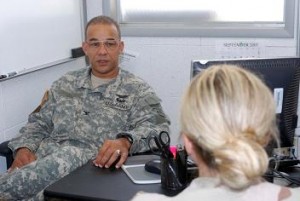

Medical Professionals Complicit In US Torture Policy
As many listeners know, health professionals were front and center and complicit in the US policy of torture. The torturers relied heavily on medical opinion. Medical professionals provided sanitizing and rationalization for the infamous torture memos. During water boarding procedures, a doctor would be present. Psychologists were directly involved in the supervision, design and execution of torture at US military and intelligence facilities. This is a violation of state laws and professional ethics. These “health professionals” that were involved with torture still hold their professional licenses to practice. Meanwhile a legal battle continues against the Louisiana Psychology Board for refusing to investigate professional misconduct allegations against Dr. Larry James. He’s a retired US Army Colonel and high ranking adviser on interrogations for the US military in Guantanamo Bay.
We talk more about this case and the breach of ethics in the medical profession since 9/11 with Dr. Stephen Soldz, former president of Psychologists for Social Responsibility. Stephen is a psychologist, psychoanalyst and public health researcher in Boston, he is also co-author of PHR’s report in Experiments in Torture.
Stephen Soldz :
- Psychologists played a central role, there were 2 professions, one was lawyers, the other less well known was psychologists. It turns out that it was psychologists that designed and implemented, the enhanced interrogation torture program, who monitored it, who trained others in it and who researched it and provided all the legal protection.
- It’s believed that it was psychologist James Mitchell who was present there, who was in charge.
- There’s the CIA program that was for so called high value detainees in CIA custody in various secret prisons called black sites. This is where the psychologists were central, they designed the whole thing.
- There was a black site at Guantanamo where a few people were held at various points.
- Guantanamo was technically under the military control, not CIA control.
- The CIA: like I said the psychologists designed this stuff, it was quite brutal. Forcing people to stand, shackling them up, with their arms out, naked in cold air. For 7 days at a time.
- Being forced to stand day after day is extraordinarily painful. Think about having to do that without using the toilet, with liquid food being forced into you. They at times used small boxes where a person could neither stand or sit.
- The boxes were banged on at times, they would throw people against walls, with special devices around their neck supposedly to protect them from permanent damage. There were various slaps that were authorized.
- The American Psychology Association has an ethics code and its binding on all members. Not all psychologists are members, but all the states base their own ethics code for licensed psychologists upon that of the APA, some mandate it exactly some adopt their own.
- The CIA and military insist that the psychologists that do this stuff be licensed by the state.
- Many of them are APA, so the APA ethics are intimately involved here.
- The APA equivocated and formed a task force. They said that psychologists had an obligation to keep interrogations, safe legal and effective. This language it turns out was taken from the Bush torture memos at the Justice Department. The task force was dominated by the military.
- They claim to be resolutely against torture, they make statement after statement. Psychologists shouldn’t be safety officers.
- In all 3 states, lawyers have joined my colleagues to force the APA board to do their job. The board doesn’t have the leeway to dismiss claims of torture without clearly investigating them.
- Larry James was a Biscuit 1 and later served at Abu Ghraib after the scandals there, he claims to have been the person who cleaned it up.
- He admits that he observed abuse by other people and didn’t report it to the commanders.
- He’s now out of the military and the Dean of the School of Psychology at Wright State University in Ohio.
- It’s rather sad, instead investigating what did or did not happen, they attack those who raise issues about Colonel James.
- Physicians For Human Rights / When Healers Harm
Guest – former President of Psychologists for Social Responsibility, Stephen Soldz is a psychologist, psychoanalyst, and public health researcher in Boston, and was a co-author of PHR’s report Experiments in Torture. He is the Director of the Center for Research, Evaluation, and Program Development at the Boston Graduate School of Psychoanalysis. He was Adjunct Assistant Professor of Psychology (Psychiatry) at Harvard Medical School, and has taught at the University of Massachusetts Boston, Boston College, and Boston University.
——–

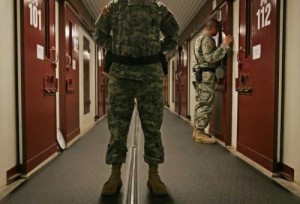
Guantanamo Bay and Offshore Prisons
The Obama Administration has allowed the Bush policy to continue allowing for the practice of torture, rendition and secret prisons to continue. We talk about the ongoing practice of torture, secret sites and Guantanamo Bay. There are 3 groups at Guantanamo, the first is 2 dozen that are genuinely Al Qaeda. The second group shouldn’t have been there in first place, around 200 of them will be sent home. The third group are refugees who are from countries with horrible human rights records.
Attorney Vince Warren:
- What role do the people play in order to stop this? (wars) We are at war to make war is what the public has bought into. By using the war paradigm, the president seized power that belonged to Congress, seized power that belonged to the Courts and seized power that belonged to the people.
- You can’t be at war with the “concept” of terror.
- Prior to 9-11 when terrorism would happen. There was an investigation, an indictment, prosecution and if there was a case, they were to be convicted.
- As of 2011, more people in Guantanamo have died than have been referred for criminal charges.
- We shouldn’t fool ourselves into thinking that this was a genuine reaction to a tragic event.
- This aggressive war(s) that are based on lies, without any legitimate security threat, is a crime.
- The other piece since 9-11 is the interesting double speak. Torture and aggressive war become justifications since 9-11.
- The Bush Justice Department said that the law simply does not just apply to the President, when he’s acting as Commander In Chief. It doesn’t matter if Congress passed a law that we expect the President to be bound, the Justice Department said he could ignore it if it didn’t fit in to what he wanted to do.
- That led to the Bush lawyers counseling him that he could ignore a law that said torture was illegal or could ignore a law that says the government can’t wiretap without a warrant.
- President Obama talked very big about ending torture and about ending these policies.
- What is happening now in the United States is that local police forces, immigration forces, private contractors are colluding and conspiring to infiltrate political movements and largely peaceful political movements.
- – in order to “uproot the terrorist.”
- Course there are no terrorists there, what there are are people who have a very vibrant and credible claim.
- Myself and a number of other human rights people went to a meeting with President Obama in May 2009. I was shocked at how President Obama completely understood the legal issues we were raising.
- The very next day he essentially came out with a preventive detention scheme. An indefinite detention scheme in Guantanamo.
- What really troubled me is that he knows. He knows precisely what the right thing to do is.
- This thing is not going to fix itself. CCR Facebook – Twitter @theCCR
Guest – Attorney Vince Warren, Executive Director of the Center for Constitutional Rights, a national legal and educational organization dedicated to advancing and defending the rights guaranteed by the United States Constitution and the Universal Declaration of Human Rights. Vince oversees CCR’s groundbreaking litigation and advocacy work which includes using international and domestic law to hold corporations and government officials accountable for human rights abuses; challenging racial, gender and LGBT injustice; and combating the illegal expansion of U.S. presidential power and policies such as illegal detention at Guantanamo, rendition and torture.
—————————————-


























